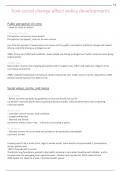4.2
how social change affect policy developments
Public perception of crime
- views on crime or actions
Changing perception:
Perceptions can become more lenient
Perceptions can deepen, view act as more serious
e.g. drink driving wasn’t always seen as an issue until the public’s perception started to change and viewed
driving, and drink driving as a dangerous act
1966, all new cars fitted with seatbelts, made people see driving as dangerous if safter measures were being
implemented.
Tougher laws:
More public concern and changing perceptions led to tougher laws, 1967 road safety act, illegal to drive
over blood alcohol limit
1968, roadside breathalysers introduced, deaths reduced by over 1,000, serious injuries reduced by 11,000
Alcohol related injuries from 25% to 15%
Social values, norms, and mores
Social values
- Beliefs and what we abide by guidelines on how we should live our life
e.g western countries place value on gaining individual wealth, tribal societies place value on gaining
collective wealth
Social norms
- unwritten rules of society, how to behave
- accepted behaviour
- informal and formal
e.g formal, written rules in law informal, not jumping a queue
Social mores
- Extreme versions of norms what we consider to be absolutely unbreakable
e.g incest, murder
smoking used to be a social norm, legal to smoke inside, some doctors reccommnded it, promoted by
media, glamourised
1950’s showed links to cancer
The British lung foundation wanted to ban adults smoking in cars when travelling with children, and to
remove colourful packaging from cigarette boxes. Children and Families Act 2014 made this law
2006 health act, illegal to smoke in enclosed public spaces





